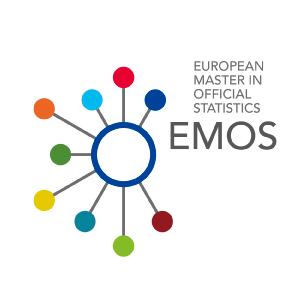Worldwide
- European Statistical System (ESS)
- European Master in Official Statistics (EMOS)
- ESS Vision 2020
- ESS Governance bodies
- Cooperation with international organisations
- Sustainable Development Goals (SDGs)
- International Data Alliance for Children on the Move
- European Statistics Day
- World Statistics Day
- European Big Data Hackathon
- IMF - SDDS
- United Nations Statistical Commission (UN STATCOM)
emos
EMOS - Post-graduate education in Official Statistics at European level

What is EMOS?
The European Master in Official Statistics (EMOS) is a network of Master programmes providing post-graduate education in the area of official statistics at European level. EMOS is a joint project of universities and data producers in Europe.
Why EMOS ?
- added value for the Master programme
- combination of theory and hands-on training
- a programme with European dimension
- internships and master thesis topics on specific statistical applications
- great opportunities for a career in EU statistical agencies
- Learning Outcomes of the EMOS programmes
How a Master programme is awarded the EMOS label?
Greek EMOS labelled Universities AUTh and AUEB
- Results of the 2018 call for application / Information on awarding EMOS label to Master “Statistics and modelling” to the Department of Mathematics of the Aristotle University of Thessaloniki (AUTh)
- Results of the 2021 call for application/ Information on awarding EMOS label to Master “Applied Statistics” to the Department of Statistics of the Athens University of Economics and Business (AUEB).
- EMOS label certificates of AUTh and AUEB
- Announcement for the EMOS label certificate – AUTh
- Announcement for the EMOS label certificate – AUEB

